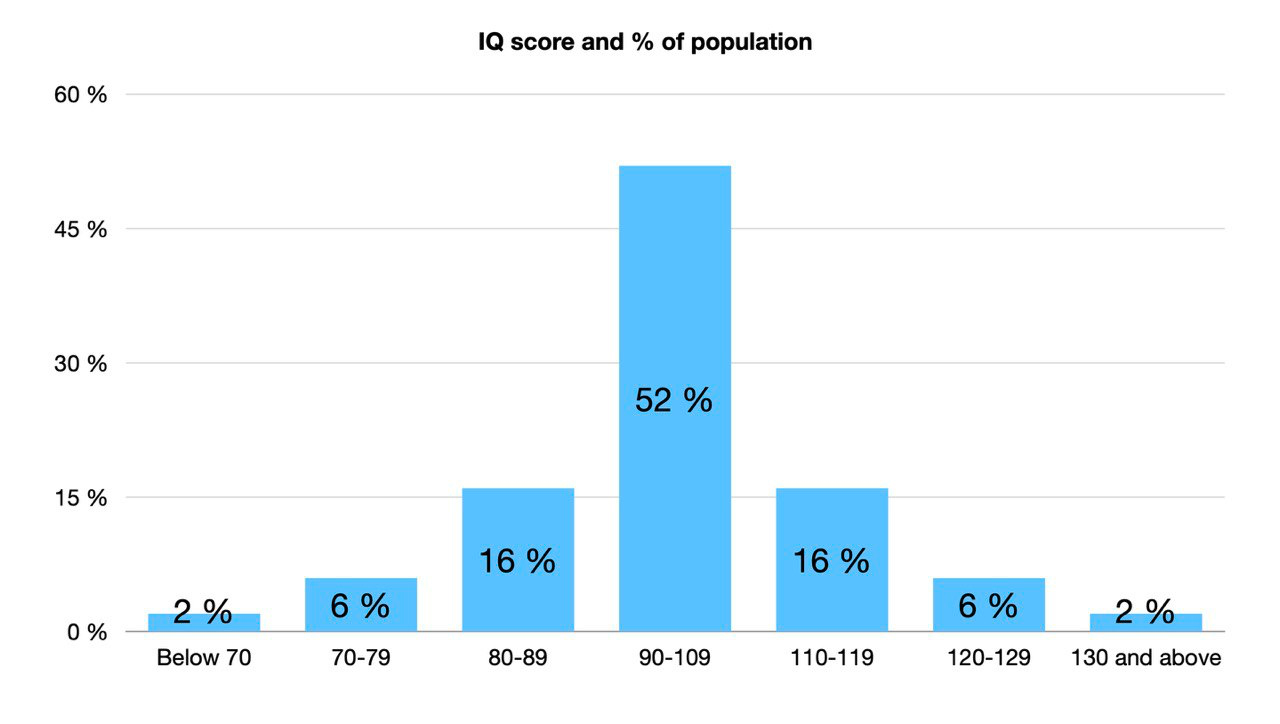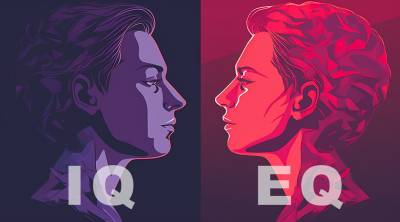IQ classification: What Does an IQ Score Mean?

IQ Test Score (result) Meaning
IQ scores were developed to give a general idea of a person's intellectual abilities. Unfortunately, these indicators do not cover all the diverse forms of human intelligence. That is why IQ scores are tentative for determining the level of intelligence.
IQ test scores are calculated using a specific scale that compares an individual's performance to the average performance of their peers. The IQ scale is designed so that the average score is 100, with a standard deviation of 15 points. This means that the majority of people will score between 85 and 115, which is considered average intelligence.
While most people will score within the average range, some individuals will achieve exceptional scores, both high and low. An IQ score of 130 or higher is considered very high intelligence, while a score below 70 is considered significantly below average. These extreme scores are relatively rare and represent only a small percentage of the population.

IQ Classification
How to interpret IQ score
There are several IQ classification systems used to categorize and describe different levels of intellectual ability. Some of the most widely known and used classifications include the Wechsler Scale, the Stanford-Binet Scale, and Cattell's Scale. Each scale has its unique way of grouping scores and defining intelligence levels.
Wechsler Scale
The Wechsler Scale, developed by psychologist David Wechsler, is one of the most used IQ tests today. It consists of separate tests for adults (WAIS) and children (WISC). The Wechsler Scale uses a standard score of 100 as the average, with a standard deviation of 15. The classification categories are as follows:
| IQ Score Range | Classification |
|---|---|
| Below 70 | Extremely Low |
| 70-79 | Borderline |
| 80-89 | Low Average |
| 90-109 | Average |
| 110-119 | High Average |
| 120-129 | Superior |
| 130 and above | Very Superior |
Stanford-Binet Scale
The Stanford-Binet Scale, originally developed by French psychologist Alfred Binet and later adapted by American psychologist Lewis Terman, is another widely recognized IQ test. The Stanford-Binet Scale also uses a standard score of 100 as the average, with a standard deviation of 15. The classification categories are as follows:
| IQ Score Range | Classification |
|---|---|
| Below 70 | Intellectually Disabled |
| 70-79 | Borderline |
| 80-89 | Low Average |
| 90-109 | Average |
| 110-119 | High Average |
| 120-129 | Superior |
| 130-144 | Gifted |
| 145 and above | Highly Gifted |
Cattell's Scale
Developed by British psychologist Raymond Cattell, Cattell's Scale measures intelligence using a different scoring system. It uses a standard score of 100 as the average, but with a standard deviation of 24 points. The classification categories are as follows:
| IQ Score Range | Classification |
|---|---|
| Below 74 | Extremely Low |
| 74-90 | Borderline |
| 90-110 | Average |
| 110-130 | Above Average |
| 130-150 | Superior |
| 150 and above | Genius |
Factors Affecting IQ Scores
It's crucial to understand that an individual's IQ score is shaped by a multitude of variables and isn't a definitive or immutable measurement of their intellectual capabilities. These scores are influenced by a combination of genetic determinants inherited from parents, and environmental factors, such as the socioeconomic conditions and cultural context in which an individual is raised.
Educational opportunities play a significant role too; individuals who've had access to quality education and intellectually stimulating activities generally tend to perform better on IQ tests. The nutrition and healthcare received during early childhood, which are known to have profound impacts on brain development, can also influence scores.
Personal characteristics of the individual being tested, such as motivation, effort, and even their state of mind on the day of the test, can affect performance. Test anxiety or lack of familiarity with the test format could lower scores, while high motivation and confidence could enhance performance.
Personal Growth and Potential

Interpreting your IQ test results involves understanding what the score means for you personally. It's important to remember that your IQ score is just one measure of your cognitive abilities and should not define your self-worth or potential. Instead, use your score as a starting point for personal growth and development. Focus on areas where you excel, while also recognizing and working on areas where you may need improvement. You can read more about How to Increase IQ.
While an IQ score can provide valuable insights, it should not be considered an all-encompassing assessment of a person's intellectual potential or future success. IQ scores can change over time and with targeted effort. For those interested in boosting their cognitive abilities and IQ scores, resources such as the article “How to Increase Your IQ” provide useful strategies. Ultimately, intellectual growth is a lifelong journey, and understanding our cognitive strengths and weaknesses is just one step along the way.
Limitations of IQ Tests
Keep in mind that IQ tests have their limitations and may not fully capture all aspects of your intelligence. Some people may perform better on certain types of tasks, while others may excel in areas that are not assessed by traditional IQ tests. Additionally, factors like test anxiety, cultural bias, and language barriers can impact test results. It's crucial to view your IQ score as just one piece of the puzzle when evaluating your intellectual abilities.





